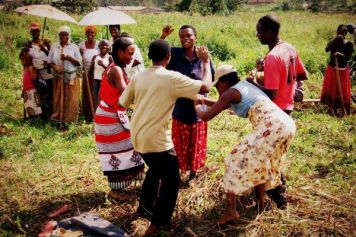 Special Issue on Transformative Change in Community Mental Health
Special Issue on Transformative Change in Community Mental Health
Greg Townley and John Sylvestre
Guest Co-Editors
Peer Reviewed
This special issue of the Global Journal of Community Psychology Practice (GJCPP) aims to articulate a vision and provide suggestions for transformative change in community mental health. Certainly, in the contributions we have assembled here we can claim no clear or simple solutions. What we can offer are examples of the range of ideas, actions, and levels of actions that can be considered in the quest for transformed community mental health systems.
Read more... Improving Global Knowledge Exchange for Mental Health Systems Improvement
Improving Global Knowledge Exchange for Mental Health Systems ImprovementHeather L. Bullock, Fredrik Lindencrona, Gary S. Belkin, Jane Vanderpyl, Nicholas Watters, and Kevin Hennessy
Peer Reviewed
Policymakers globally are paying increasing attention to the challenges of providing more accessible and integrated mental health care. For transformative change to take place, thought needs to be given to the structure and form of evidence-informed change strategies at all levels. This paper examines how a specific analytical model developed to assess and develop Knowledge Exchange (KE) can be applied to regional and national KE initiatives.
Read more... Integrating Complexity and Infant Mental Health for Comprehensive Community Change
Integrating Complexity and Infant Mental Health for Comprehensive Community ChangeAllison Pinto
Peer Reviewed
This paper highlights features of the current U.S. policy landscape that signal a readiness to address community transformation, identifies key principles of complexity and infant mental health that make these orientations especially relevant to transformation, presents Central-Cocoanut as a community case example of efforts to apply complexity and infant mental health, and begins to explore the implications of a new model for transformation that is emerging at the neighborhood scale.
Read more... Moving Beyond “Better Safe Than Sorry”: Realizing Community Potential to Transform Approaches to Psychiatric Hospitalization
Moving Beyond “Better Safe Than Sorry”: Realizing Community Potential to Transform Approaches to Psychiatric HospitalizationJessica Nalani Lee
Peer Reviewed
This essay is composed of three parts to analyze how the field of community psychology can help transform aspects of psychiatric hospitalization that may inadvertently reify oppressive social constructs.
Read more... The Capabilities Approach, Transformative Measurement, and Housing First
The Capabilities Approach, Transformative Measurement, and Housing FirstTimothy MacLeod
Peer Reviewed
Transformative change to mental health systems involves transformation in how practices, policies, and research respond to the needs of individuals with psychiatric disabilities. This paper presents Amartya Sen’s capabilities approach as a promising framework for outcome measurement congruent with the aims of transformative change in mental health systems. In this paper, Sen’s capabilities approach is contrasted with therapeutic and citizenship values as well as the Housing First approach to housing.
Read more... Community Transformation and Collective Healing: Lessons from Pakistan, Brazil, and Zambia
Community Transformation and Collective Healing: Lessons from Pakistan, Brazil, and ZambiaChante’ D. DeLoach and Sujata Regina Swaroop
Peer Reviewed
In this article, the authors utilize traditional mechanisms of healing in Pakistan, Brazil, and Zambia as case studies to advocate for a community based mental health promotion model that weds: 1) prevention and health promotion; 2) professional allopathic service providers partnering with paraprofessional and traditional health practitioners; and 3) community engagement and political literacy as a transformative and empowering mental health system of care that targets the individual and the community as source and location of intervention and healing.
Read more... Introducing Housing First in a Rural Service System: A Multistakeholder Perspective
Introducing Housing First in a Rural Service System: A Multistakeholder PerspectiveBenjamin F. Henwood, Kelly Melekis, Ana Stefancic
Peer Reviewed
Housing First (HF) represents a fundamental shift in thinking about how to address chronic homelessness that has taken place during the past two decades. Using a case study approach and thematic analysis of accounts from 20 key stakeholders, this study investigated whether and how the introduction of HF into a small, rural state in the Northeastearn United States affected the dominant institutional logic.
Read more... Listening to Consumer Perspectives to Inform Addictions and Housing-Related Practice and Research
Listening to Consumer Perspectives to Inform Addictions and Housing-Related Practice and ResearchStephanie A. Farquhar, Marianne Ryder, Derek Henderlong, Robert A. Lowe, and Ted Amann
Peer Reviewed
HEARTH, established in 2010, is a community-academic partnership involving partners from Portland State University (PSU), Oregon Health and Science University (OHSU), and Central City Concern (CCC). Using the approaches of community-based participatory research (CBPR), these diverse stakeholders collaborated to co-develop research of direct relevance to the local community and to national academic and policy communities.
Read more... Mental Health Systems Transformation through Participatory Evaluation and Action: The Transition-age Youth Appreciative Inquiry/Photovoice (“YAP”) Project
Mental Health Systems Transformation through Participatory Evaluation and Action: The Transition-age Youth Appreciative Inquiry/Photovoice (“YAP”) ProjectThomas M. LaPorte, Mason G. Haber, Damie Jackson-Diop, and Brittany Holt
Peer Reviewed
The present paper describes how specific strategies for PAR, including Appreciative Inquiry and Photovoice, were employed in the Youth Appreciative Inquiry and Photovoice (YAP) project to: 1) gather perspectives of TAY in two statewide youth and family operated programs on needs and aspirations, current responsiveness of their programs and systems, and possible targets for program and system improvement; and 2) share these perspectives with stakeholders to effect change through a video.
Read more... What Transformation? A Qualitative Study of Empowering Settings and Community Mental Health Organizations
What Transformation? A Qualitative Study of Empowering Settings and Community Mental Health OrganizationsMaria F. Jorge-Monteiro, Rita Aguiar, Beatrice Sacchetto, Maria J. Vargas-Moniz, and José H. Ornelas
Peer Reviewed
This article is based on empowering settings research and has a two-fold objective: to propose an adaptation of the empowering community settings framework to community mental health organizations practice to foster recovery and community integration; and to discuss how the adapted framework is a relevant tool to challenge community mental health transformation at multiple levels of analysis.
Read more... Leadership, Empowerment, Advocacy Project (LEAP): College Education for Recovery and Transformative Change in Community Mental Health
Leadership, Empowerment, Advocacy Project (LEAP): College Education for Recovery and Transformative Change in Community Mental HealthVicky Lynn Collins
Peer Reviewed
The Leadership, Empowerment, Advocacy Project (LEAP) students represented a heterogeneous groups of individuals commonly referred to as consumers/ peers who deal daily with severe and persistent mental health disorders and/or substance use disorders. This radical strategy created recovery and empowerment by producing an optimistic future for students that reflects personal goals of improved quality of life, a reduction in mental health symptoms, and the achievement of valued social roles.
Read more... Peer led Recovery Learning Communities: Expanding Social Integration Opportunities for People with the Lived Experience of Psychiatric Disability and Emotional Distress
Peer led Recovery Learning Communities: Expanding Social Integration Opportunities for People with the Lived Experience of Psychiatric Disability and Emotional DistressJonathan Delman, Deborah R. Delman, Brenda R. Vezina, and John Piselli
Peer Reviewed
With the aim of enhancing that approach, peers in Massachusetts developed the “Recovery Learning Community” model, a regional network of peer support and education operated and staffed by people with lived experience, are distinct from most other peer run programs in that they provide meetings and workshops in various community locations, not only in a single location. In this article, we describe conceptually and with examples the significant impact RLCs have on both the social integration of people with PD and the delivery of mental health services in United States and internationally.
Read more... Creating Deep Democracy through Peer Wellness Services
Creating Deep Democracy through Peer Wellness ServicesMeghan Caughey
Peer Reviewed
The Cascadia Peer Wellness Program utilizes the unique and powerful resource of persons with lived experience of psychiatric diagnosis by training and employing Peer Wellness Specialists to partner with clinicians and other healthcare team members in order to help those they serve find their way to recovery.
Read more...
Réunir les solitudes (A feeling of belonging)
Using the testimonies of beneficiaries, local stakeholders, project leaders and technicians, the aim of the documentary is to convey: How, via income-generating activities, it is possible to rekindle a suffering person's sense of self ("I") and his/her ability to take action for his/herself in his/her environment. How these activities can also re-awaken a feeling of community ("us"), enabling individuals to cope with new social participation constraints caused by their vulnerable or disabling situations.
Watch the videoWe hope you enjoy this Special Issue. The Guest Editors, along with the authors, provided excellent content related to the theme of Transformative Change in Community Mental Health.
The International Network for Transformative Change in Community Mental Health includes an international group of academics and graduate students who are seeking to establish an alternative paradigm to the promotion of mental health based in community settings upon the values of citizenship, recovery, empowerment, inclusion, and social justice. Please email Greg Townley at gtownley@pdx.edu for more information or to join the Network!